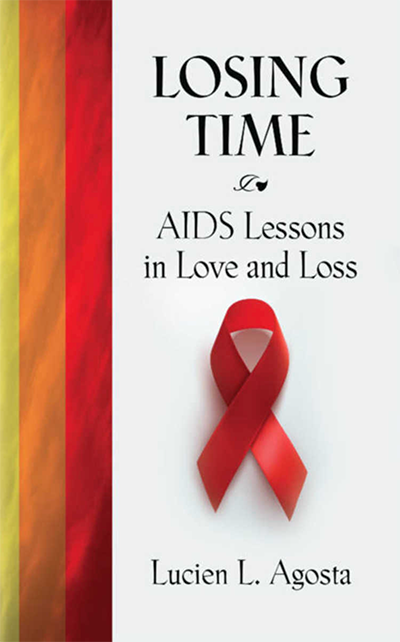 Losing Time: AIDS Lessons in Love and Loss
Losing Time: AIDS Lessons in Love and Loss
When I picked up Lucien L. Agosta's memoir Losing Time: AIDS Lessons in Love and Loss, the reader in me prepared to savor a gay love story, but the judge in me wondered how this topic could be made fresh. Classics like Paul Monette's Borrowed Time, the anthology Persistent Voices: Poetry by Writers Lost to AIDS, and our own 2017 North Street Book Prize Honorable Mention The Sea Is Quiet Tonight by Michael H. Ward, have exquisitely memorialized the lost generation of cisgender gay men who symbolize the "AIDS crisis" in the popular imagination. Meanwhile, there are many AIDS stories left untold from our Black, Latinx, and transgender communities, where expensive antiretroviral drugs still remain out of reach. Though Agosta's account covers well-trodden ground in that it centers on a white middle-class couple in the 1990s, its power and uniqueness reside in how vividly the author reconstructs day-to-day life with a terminally ill lover.
Poetically written and rich with physical detail, Losing Time recounts Agosta's love affair with Dore Tanner (1949-98) in 1990s Sacramento. Dore was already HIV-positive when they met, a challenge that gave Lucien pause, but falling in love was as irresistible as it was surprising. Agosta was teaching English at Cal State and enjoying the sexual freedom of Sacramento's gay bars after closeted Kansas. He didn't want or believe in anything permanent. This passage about their first meeting in a bar called the Wreck Room typefies the lyrical writing that made this book such an immersive experience for me:
Fickle, fascinated with sex, eschewing human complexity and claims, I sought pleasure, always willing to give it to get it. But in the Wreck Room that night, I had a collision with what I would come to recognize as the real, though I would not realize the impact of that crackup for some time. My lightsome blood would thicken on later learning what coiled in yours, had insinuated itself into your very DNA like the poison sap from the apple eaten in Eden…I was to learn in you the resonantly human at last, its text of sorrow and joy. Human fullness would in time be love-taught. (page 37)
The 1990s were big on AIDS martyr melodramas written to tug the heartstrings of straight people, like the musical "Falsettos". Such appeals to the majority's compassion were politically necessary so that medical care would get funded. Losing Time is not that kind of story, and that's refreshing. Agosta is candid and explicit about what makes (some) gay male partnerships different from mainstream expectations about love and sex. Reflecting on a bathhouse hookup he engaged in while Dore was sick at home, Lucien argues with the ghost of his Catholic guilt:
Is it right to use someone who wants to be used, who obviously takes pleasure in being used…Isn't there a reciprocity there, a kind of mutuality, in a way a kind of instant and satisfying intimacy, even affection, however temporary? (page 194)
The irony is that his partnership with Dore is equally temporary, tragically so. Love has to be distinguished from mere lust by something other than its permanence. Immediately after this Saturday night scene in the bathhouse, Lucien describes Sunday afternoon caring for his lover, who is feverish and can barely eat.
I propped myself up with pillows against the arm of the couch. You lay between my legs, your head resting on my chest, directly over a heart ever true to you, ever faithful. (page 195)
The story was well-structured, with a wide emotional range that included humor and aesthetic pleasure as well as the indignities of illness. A colorful cast of family, friends, and caregivers accompanied the author through his lover's final years. At times I felt the poetic writing became too flowery, layering on too many similes where a simple description would have sufficed.
Agosta comments on his subculture's superficial obsession with youth and good looks, but he could have used more self-awareness about his own prejudices. He frequently comes across as judgmental of other people's bodies, with "humor" that shades into classist and racially problematic caricature. Perhaps the Asian man at the bathhouse did speak in broken English, but was it necessary to include that in the scene? It strained credulity that the rural Texan couple they met in the RV park really spoke like characters out of "Li'l Abner" and had names like "Peaches Dwindle". Nor was it necessary or funny to describe the plus-size Mrs. Dwindle's walk as "her buttocks tussling together like two pigs struggling in a gunny sack." These people were harmless and nice to him.
The white cover with a rainbow stripe and a red AIDS ribbon was somewhat bland, not hinting at the aesthetic sophistication of the text. The sans-serif interior font was not all that pretty but it was clear and legible. The interior formatting was clean, with sufficient margins and spacing. The binding held up well when the book was read and carried around.
One might think it incongruous to call this tragic story "a pleasure to read," but the talent for finding beauty in fleeting and even painful moments is a gift from the gay culture of Agosta's generation, which he has shared with us in Losing Time.
Read an excerpt from Losing Time (PDF)
Buy this book on Amazon









